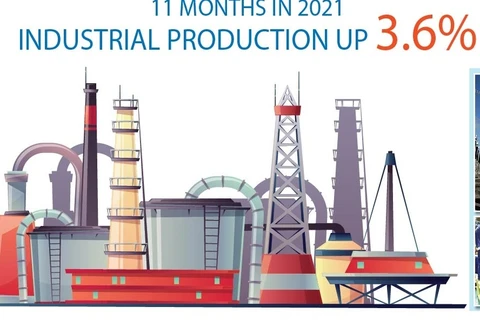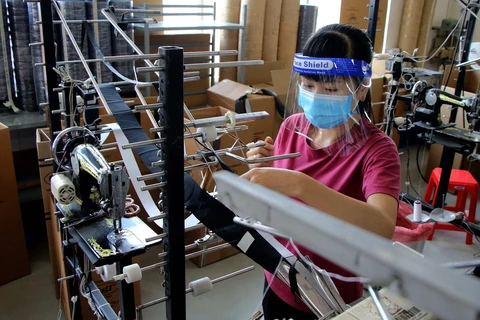Hanoi (VNA) – The COVID-19 pandemic has caused an unprecedented impact on Vietnamese businesses, leaving them in a constant state of flux and ready to close or open their doors depending on the situation.
Before COVID-19, many major enterprises in Vietnam were full of orders from the beginning of the year and even had adequate orders for the whole year by the start of the second quarter.
However, the COVID-19 "storm" erased almost all of their efforts and achievements. Demand seriously dropped, and many contracts were disrupted.
Even after receiving orders, many businesses had to regretfully refuse them because they did not have enough workers to meet demand.
Struggling with resource exhaustion
Nguyen Ba Hong, the owner of a handicraft production facility in the northern province of Bac Ninh specialising in exporting products to China, said that each month that his business was forced to close due to the pandemic, it lost hundreds of millions of Vietnamese dong.
He shared that in the early stages of the pandemic, his company still had orders to maintain production. However, when the fourth wave of COVID-19 hit Vietnam, many localities implemented social distancing and production activities were almost frozen due to the inability to import input materials. Partners also faced financial difficulties, and the cost of transportation was high, so he had to suspend production to cut losses as soon as possible.
This didn't just affect small-sized enterprises, but also big names.
With about 12,000 employees working at 18 factories in seven provinces and cities, Garment 10 Corporation - Joint Stock Company (a member of the Vietnam Textile and Garment Group) had to exert every effort to resist.
Than Duc Viet, General Director of the corporation, said that the biggest worry at that time is that a hike in the number of COVID-19 patients would force enterprises into a constant standby, in anticipation of every uncertainty, making it difficult to fulfil their set targets.
Vice-Chairman of the Vietnam Garment and Apparel Association (VITAS) Truong Van Cam said that garment and textile exports continued decreasing in July, August and September of 2021. The decline only ended when the Government issued Resolution 128, meaning businesses could resume their production and complete their orders.
Worrying about COVID-19 risks
The pandemic has caused a risk of value and supply chain disruption. On the other hand, regulations on social distancing have also significantly affected the goods circulation and transportation of businesses.
To adapt and live safely with the pandemic, in addition to speeding up vaccination, the Department of Industry under the Ministry of Industry and Trade suggested ministries, sectors and localities coordinate with each other and implement measures concertedly to avoid the promulgation and implementation of policies that are inconsistent with the Government’s of pandemic prevention and control in the new normal, causing congestion and difficulties in the circulation and transportation of goods and the movement of workers.
In addition, it is necessary to have more detailed and specific instructions on the pandemic prevention process in the new situation for businesses.
Authorised offices should have policies to facilitate the return of the workforce, especially in cities and large industrial centres as soon as possible, ensuring they can effectively access the State's social welfare support policies to quickly restore the labour supply for production, said a representative of the Department of Industry.
According to Mac Quoc Anh, Vice President and General Secretary of the Hanoi Small and Medium Enterprises Association, the Government and city have accompanied, supported and created favourable conditions for businesses.
“Many support policies are assessed useful, but there is still a long distance from policy to actual implementation, especially, borrowing capital with no interest rate to pay wages to employees is considered a policy most difficult to access because of many enclosed conditions,” said Anh./.
























